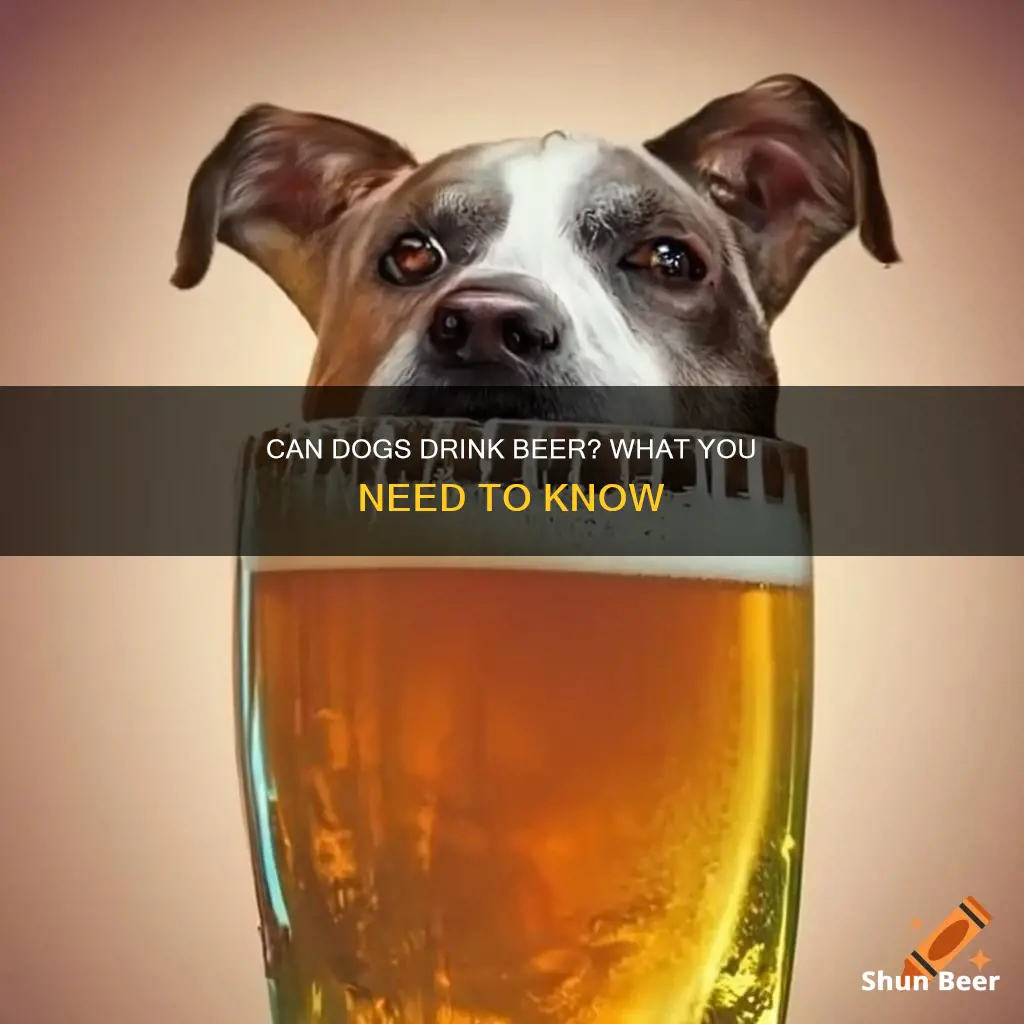
Beer is toxic to dogs and can cause alcohol poisoning, so it's important to keep it away from your canine friends. Even a small amount of beer can be harmful to dogs, and they can develop alcohol poisoning very quickly. If you think your dog has consumed beer, contact your vet immediately.
| Characteristics | Values |
|---|---|
| Amount of alcohol needed to cause intoxication | 5.5 to 7.9 g/kg of 100% ethanol |
| Dogs' attraction to beer | Sweet taste, smell, curiosity, or desire to have what their owners are having |
| Signs of alcohol poisoning | Mild staggering, incoordination, difficulty breathing, vomiting, decreased respiratory rate, low body temperature, low blood sugar, lethargy, disorientation, tremors, seizures |
| Treatment | Induce vomiting (if instructed by a vet), provide veterinary care |
| Prevention | Put the dog in another room, store alcohol away from the dog, do not leave alcoholic drinks unattended, use a glass with a lid |
What You'll Learn

Beer is toxic to dogs
Dogs do not have the same ability as humans to process alcohol efficiently. Alcohol is absorbed faster and spreads more quickly through a dog's bloodstream. As such, it takes very little alcohol for poisoning to develop in dogs. Only a few licks of beer are often enough for small dogs to appear drunk.
If a dog has consumed beer, they may appear confused, have difficulty walking and standing, and become more lethargic. Additional signs of alcohol poisoning in a dog include a decreased breathing rate, low body temperature, and abnormalities in electrolytes due to dehydration. Low blood sugar frequently develops, which may result in body tremors and seizures. In severe cases, intoxication can progress to a coma and even death.
If your dog has consumed beer, you should contact an emergency vet immediately. If it has been less than 15 minutes since ingestion, a vet may be able to induce vomiting to help remove the alcohol from the dog's digestive system. If it has been longer, vets can determine if the amount ingested is toxic and provide supportive care.
To prevent dogs from drinking beer, it is important to keep alcoholic drinks away from them and never leave them unattended. Beer and other alcohol should not be deliberately offered as a treat to dogs.
Beer and Keto: What You Need to Know
You may want to see also

Dogs can quickly develop alcohol poisoning
Alcohol poisoning in dogs can occur from ingestion of alcoholic drinks, or other substances containing ethanol, such as uncooked bread dough, or liquid medications. Even a few licks of beer can be enough to cause alcohol poisoning in small dogs. The amount of ethanol needed to cause intoxication varies depending on its concentration in the substance ingested, and the size and weight of the dog.
Signs of alcohol poisoning in dogs include depression or lethargy, lack of coordination, vomiting or retching, decreased respiratory rate, low blood sugar, low blood pressure, and low body temperature. These symptoms can lead to seizures, respiratory distress, metabolic acidosis, and even death.
If you suspect your dog has consumed alcohol, contact your vet immediately. Do not try to treat alcohol poisoning at home, unless a veterinarian instructs you to do so. The vet may induce vomiting to help remove the alcohol from your dog's digestive system, but only if it has been less than 120 minutes since ingestion.
Beer Drinking: A Sleep Inducer or Myth?
You may want to see also

Dogs absorb alcohol faster than humans
Dogs should not drink beer or any other kind of alcohol. Even a small amount of alcohol can be toxic to dogs and cause alcohol poisoning. Dogs are highly sensitive to the effects of alcohol, and it is absorbed faster and spreads quicker through their bloodstream.
Dr Nell Ostermeier, DVM and veterinary spokesperson at Figo Pet Insurance, says that "even a small amount [of alcohol] may lead to symptoms of intoxication". These symptoms include mild staggering, incoordination, and difficulty breathing. Dogs are also smaller than humans, so it takes less alcohol for poisoning to develop. For example, only a few licks of beer are often enough for small dogs to appear drunk.
If your dog does drink alcohol, you should seek immediate veterinary assistance. If it has been less than 15 minutes since ingestion, a vet may be able to induce vomiting to help remove the alcohol from your dog's digestive system. If it has been longer, vets will determine if the amount ingested is toxic and choose supportive care. If your dog is staggering or disoriented, go straight to the emergency vet.
Dogs can also absorb alcohol transdermally (through the skin), so alcohol-based cleaning products should be kept out of their reach.
Drinking Beer During Restricted Hours: Is It Okay?
You may want to see also

Alcohol can cause changes to a dog's brain
Alcohol can be extremely harmful to dogs, even in small amounts. Dogs are highly sensitive to the effects of alcohol, and it can be absorbed quickly through their skin or orally. Research has shown that alcohol can cause changes to the structure of a dog's brain, affecting the parts of the brain that control balance, memory, speech, and judgment.
In humans, alcohol misuse can cause blackouts, which are gaps in memory during intoxication. This occurs when the hippocampus, the brain area responsible for memory consolidation, is blocked from transferring memories from short-term to long-term storage. Similarly, dogs may experience changes in brain function, which can lead to long-term health issues and even be fatal.
The amount of alcohol needed to cause intoxication varies depending on the dog's weight and the concentration of alcohol ingested. Symptoms of alcohol poisoning in dogs include mild staggering, incoordination, difficulty breathing, lethargy, vomiting, low blood sugar, low blood pressure, and low body temperature.
If you suspect your dog has consumed alcohol, contact your veterinarian immediately. Do not attempt to treat alcohol poisoning at home. The veterinarian may induce vomiting to help remove the alcohol from the dog's digestive system and provide supportive care.
Black Beer Enthusiasts: Their Favorite Brews and Why
You may want to see also

Dogs can be attracted to beer by its smell or taste
Dogs have up to 300 million receptors in their noses, making their sense of smell 10,000 times better than humans. This means that they are highly sensitive to the strong scent of beer, which some people describe as similar to the smell of overripe fruit. The sweet and interesting smell of beer can pique the curiosity of dogs, making them want to taste it.
In addition to the scent, the sugar content in beer, an essential ingredient in the brewing process, can also attract dogs. Sugar is broken down into extracted sugars from the grain to create a "wort", which is then boiled and mixed with hops to create the bitter wort that is eventually fermented into beer. The presence of sugar in beer can appeal to dogs' sweet tooth, as their taste buds react highly to "furaneol", a chemical found in fruits.
While dogs may be attracted to beer by its smell or taste, it is important to note that beer is toxic to dogs and can cause alcohol poisoning even in small amounts. Ethanol, the alcohol produced during the fermentation process, can affect a dog's central nervous system, leading to symptoms such as drowsiness, lack of coordination, involuntary urination or defecation, and in severe cases, respiratory failure. Therefore, it is crucial to keep beer and other alcoholic beverages out of the reach of dogs and to seek veterinary assistance if your dog consumes any significant amount of alcohol.
Drinking Beer in Public: What's Legal in Illinois?
You may want to see also
Frequently asked questions
Yes, beer is toxic to dogs. Even a small amount of beer can be harmful, and it only takes a few licks for small dogs to appear drunk.
Signs of alcohol poisoning in dogs include vomiting, disorientation, lack of coordination, tremors, seizures, and lethargy.
If your dog drinks beer, you should contact an emergency vet immediately. Do not try to treat alcohol poisoning at home.
Dogs may be attracted to beer because of its sweet taste or its smell. Dogs may also want to drink beer because their owners are drinking it.
Yes, there are dog-safe drinks available, such as "dog beers" which are made mostly of water and bone broth. Plain water is also a good option.







